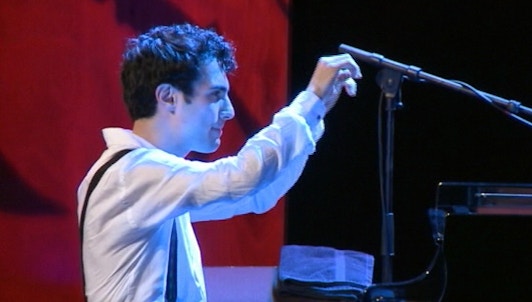Four hands, two sisters. They are the most famous piano duo in the world: Katia and Marielle Labèque from the Basque region of France.
On their latest tour they made a stop in Brussels, where they gave a concert with the Royal Flemish Philharmonic Orchestra.
The sisters have been playing together for more than 30 years and they complement each other perfectly. Katia is always recognised as the bubbly one and Marielle her calmer, romantic counterpart.
"Our balance is miraculous. We are happy to share our lives together, and that's why I think we are happy to make music together as well," said Katia.
"It's true, we share everything, the joy as well as the sadness in our musical lives and our journeys. We are very, very lucky," agrees Marielle.
They inherited their love for the instrument from their Italian mother, an accomplished piano teacher.
It is a challenge to perform as a piano duo. Learning to breathe together and to feel the same rhythm is a vital skill, and Marielle insisted that it is about more than just playing in synch:
"What I find very beautiful is that we manage after many, many years of playing together to find a certain sense of freedom, and not to feel the same things that we did at the start, which is the case for many other duos, who often get stale and mechanical because they are too busy thinking of playing together and so their playing becomes a little more rigid, and they become like metronomes. And sometimes it's better to take risks, as you really learn how to breathe together."
The repertoire for two pianos and orchestra is limited so the Labèques have created a foundation to support and commission new pieces.
But one piece has been with them since their early days: the Concerto in D Minor for Two Pianos and Orchestra. The French composer, who wrote it in 1932, mixes influences from around the world, from the French Varieté style to far eastern sounds.
"It's a very, very beautiful piece that gives me a lot of energy I have to say. Poulenc sometimes said himself that it was about bigness, energy and violence. Well, I don't find this concerto especially violent but it's true there's a real energy within, it's so well-written. It's his unique style. By using chords from all the other composers, with a pinch of Mozart here, and a dash of Stravinsky or Ravel or others elsewhere, he creates his own language," says Marielle.
When the sisters talk about it, it is like a game of ping-pong, going from Marielle to Katia and back again:
"It's very sensitive, very moving, and poetic."
"And it's very tender as well."
"There's a lot of humour, but it's never pretentious, heavy, or pompous."
The Labèque-sisters feel at home on every big stage worldwide, but there is one thing which is always challenging: there is a different piano for each occasion as they cannot take their favorite instruments on tour.
"Every night we have to adapt to a new instrument, so that's the first difficulty. Then there's the enormous size of a piano, a huge black beast. So you can't pick it up and put it under your arm, even if you do take it in hand when you play. That's the image it conjures, metaphorically speaking," says Katia.
Katia and Marielle Labèque not only work together they also live together in a baroque Palazzo in Rome.
"What is extraordinary after so many years is that our desire to play together is still as strong. That is always the biggest surprise!" says Katia.
In this story you can hear extracts from Francis Poulenc's Concerto in D Minor for Two Pianos and Orchestra



